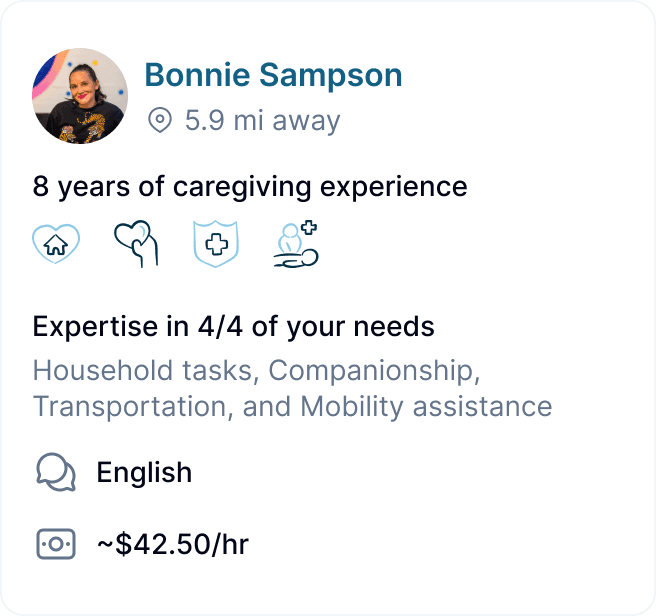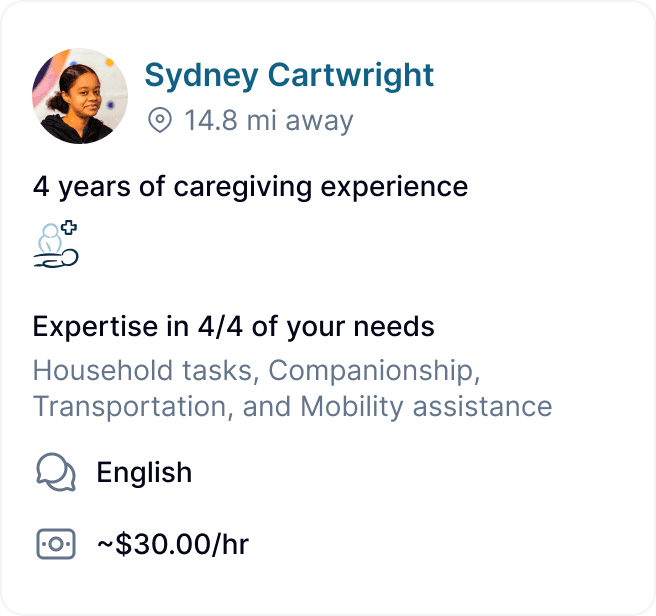Why "Under The Table" Employment Is A Ticking Time Bomb



For many American families, finding the right in-home care for an aging loved one is a deeply personal and sometimes urgent decision. The temptation to pay a caregiver “under the table”-in cash, without taxes or paperwork-can seem like a quick, easy, and even cost-saving solution. But beneath the surface, this shortcut is a ticking time bomb, carrying legal, financial, and emotional risks that can explode when you least expect it.
The Legal Minefield of Under-the-Table Caregiving
Personal Liability for Injuries
If your caregiver is injured while working for you—say, slipping on your property—you could be personally liable for their medical bills and lost wages. Without legal employment records, you likely won’t have workers’ compensation insurance to cover these costs, leaving your family exposed to lawsuits and hefty expenses.
Tax Evasion Penalties
Paying a caregiver off the books is considered tax evasion. The IRS and state agencies can impose penalties that easily exceed $10,000, and in severe cases, fines can reach $100,000 and include up to five years of jail time for willful tax evasion. Even if your intentions are good, failing to file or pay required taxes is a serious offense.
Legal employment ensures all necessary federal, state, and local taxes are properly withheld and deposited, protecting both you and your caregiver from future tax troubles.
Wage and Hour Lawsuits
California, like many states, has strict labor laws for household employees. Caregivers are often entitled to overtime pay (1.5 times the regular rate) for hours worked over 9 per day or 45 per week, as well as meal and rest breaks. Violating these rules-by not paying overtime, for example-can result in lawsuits and backpay claims. In one notable case, a California couple was ordered to pay $265,000 in backpay and legal fees after their caregiver sued for labor law violations (1).
Minimum Wage Requirements
All domestic workers in California must be paid at least the state minimum wage, which may be higher in certain cities or counties. Paying below minimum wage can result in wage theft claims and substantial fines.
Penalties for Noncompliance
Violations of employment laws can bring severe consequences:
Overtime violations may require back wages plus interest and civil penalties.
Failure to provide meal and rest breaks can cost an hour’s pay per violation.
Minimum wage violations can result in $100 penalties per underpaid employee for each pay period, plus 25% of the unpaid wages.
Some families have faced more than $30,000 in penalties-and even potential jail time-when prosecuted for intentional wage theft.
Medicaid Eligibility Risks
If you or your loved one may need Medicaid in the future, paying caregivers under the table can jeopardize eligibility. Medicaid reviews five years of financial records. Payments without documentation may be treated as gifts, resulting in penalties or delays in receiving benefits.
Real-Life Consequences: When Families Get Caught
These risks are not just hypothetical. Across the country, families have faced audits, lawsuits, and financial ruin after informal caregiving arrangements unraveled. For example:
A family who paid their caregiver in cash was audited after the caregiver filed for unemployment. The lack of official records led to back taxes, penalties, and interest.
In another case, a caregiver injured on the job sued for medical expenses and lost wages. The family, lacking workers’ compensation insurance, had to pay out of pocket.
Several families have lost eligibility for Medicaid or faced delays in benefits because they couldn’t document caregiver payments during the required look-back period.
These stories are a stark reminder that shortcuts can lead to long-term headaches and heartache.
The Benefits of Above-Board, Legal In-Home Care
Peace of Mind
Hiring caregivers legally means you’re protected from lawsuits, audits, and penalties. You’ll have workers’ compensation insurance, proper tax filings, and a clear employment record-giving you peace of mind that your family and your caregiver are both protected.
Access to Tax Benefits
Families who pay caregivers legally may qualify for valuable tax credits and deductions, such as the Dependent Care Tax Credit. These benefits can help offset the cost of care-but only if you’re following the law.
Better Outcomes for Caregivers
Legal employment allows caregivers to access unemployment, Social Security, and workers’ compensation benefits. This attracts high-quality professionals who value stability and fair treatment.
Clear Documentation for Medicaid
Proper payroll records ensure you can document all care-related expenses, protecting your eligibility for Medicaid and other benefits down the line.
How Clara Makes Legal Compliance Easy
Navigating the maze of payroll, taxes, and compliance can feel overwhelming-but Clara is here to help. As a facilitator of in-home care, Clara:
Handles all payroll, tax withholdings, and filings, so you don’t have to worry about paperwork or compliance.
Ensures you’re meeting all federal, state, and local employment laws, including overtime, minimum wage, and break requirements.
Helps you set up workers’ compensation insurance, protecting you from liability if a caregiver is injured on the job.
Provides clear documentation for Medicaid or tax purposes, so you’re always prepared.
By working with Clara, families save up to 40% compared to traditional agencies, while ensuring every “i” is dotted and “t” is crossed.
Don’t Gamble with Your Family’s Future
Paying a caregiver under the table might seem like a shortcut, but the risks-lawsuits, audits, lost benefits, and even jail time-far outweigh any perceived savings. Above-board employment protects your family, your finances, and your peace of mind.
If you’re ready to hire a vetted, high-quality caregiver and want to do it the right way, Clara is here to help. Reach out to our care consultants today to learn how we can make the process simple, affordable, and stress-free.
Have more questions about legal employment or want to know how Clara can support your family? Let us know—we’re always here to help!
Citations
1. https://gtm.com/household/family-sued-by-live-in-caregiver/
For many American families, finding the right in-home care for an aging loved one is a deeply personal and sometimes urgent decision. The temptation to pay a caregiver “under the table”-in cash, without taxes or paperwork-can seem like a quick, easy, and even cost-saving solution. But beneath the surface, this shortcut is a ticking time bomb, carrying legal, financial, and emotional risks that can explode when you least expect it.
The Legal Minefield of Under-the-Table Caregiving
Personal Liability for Injuries
If your caregiver is injured while working for you—say, slipping on your property—you could be personally liable for their medical bills and lost wages. Without legal employment records, you likely won’t have workers’ compensation insurance to cover these costs, leaving your family exposed to lawsuits and hefty expenses.
Tax Evasion Penalties
Paying a caregiver off the books is considered tax evasion. The IRS and state agencies can impose penalties that easily exceed $10,000, and in severe cases, fines can reach $100,000 and include up to five years of jail time for willful tax evasion. Even if your intentions are good, failing to file or pay required taxes is a serious offense.
Legal employment ensures all necessary federal, state, and local taxes are properly withheld and deposited, protecting both you and your caregiver from future tax troubles.
Wage and Hour Lawsuits
California, like many states, has strict labor laws for household employees. Caregivers are often entitled to overtime pay (1.5 times the regular rate) for hours worked over 9 per day or 45 per week, as well as meal and rest breaks. Violating these rules-by not paying overtime, for example-can result in lawsuits and backpay claims. In one notable case, a California couple was ordered to pay $265,000 in backpay and legal fees after their caregiver sued for labor law violations (1).
Minimum Wage Requirements
All domestic workers in California must be paid at least the state minimum wage, which may be higher in certain cities or counties. Paying below minimum wage can result in wage theft claims and substantial fines.
Penalties for Noncompliance
Violations of employment laws can bring severe consequences:
Overtime violations may require back wages plus interest and civil penalties.
Failure to provide meal and rest breaks can cost an hour’s pay per violation.
Minimum wage violations can result in $100 penalties per underpaid employee for each pay period, plus 25% of the unpaid wages.
Some families have faced more than $30,000 in penalties-and even potential jail time-when prosecuted for intentional wage theft.
Medicaid Eligibility Risks
If you or your loved one may need Medicaid in the future, paying caregivers under the table can jeopardize eligibility. Medicaid reviews five years of financial records. Payments without documentation may be treated as gifts, resulting in penalties or delays in receiving benefits.
Real-Life Consequences: When Families Get Caught
These risks are not just hypothetical. Across the country, families have faced audits, lawsuits, and financial ruin after informal caregiving arrangements unraveled. For example:
A family who paid their caregiver in cash was audited after the caregiver filed for unemployment. The lack of official records led to back taxes, penalties, and interest.
In another case, a caregiver injured on the job sued for medical expenses and lost wages. The family, lacking workers’ compensation insurance, had to pay out of pocket.
Several families have lost eligibility for Medicaid or faced delays in benefits because they couldn’t document caregiver payments during the required look-back period.
These stories are a stark reminder that shortcuts can lead to long-term headaches and heartache.
The Benefits of Above-Board, Legal In-Home Care
Peace of Mind
Hiring caregivers legally means you’re protected from lawsuits, audits, and penalties. You’ll have workers’ compensation insurance, proper tax filings, and a clear employment record-giving you peace of mind that your family and your caregiver are both protected.
Access to Tax Benefits
Families who pay caregivers legally may qualify for valuable tax credits and deductions, such as the Dependent Care Tax Credit. These benefits can help offset the cost of care-but only if you’re following the law.
Better Outcomes for Caregivers
Legal employment allows caregivers to access unemployment, Social Security, and workers’ compensation benefits. This attracts high-quality professionals who value stability and fair treatment.
Clear Documentation for Medicaid
Proper payroll records ensure you can document all care-related expenses, protecting your eligibility for Medicaid and other benefits down the line.
How Clara Makes Legal Compliance Easy
Navigating the maze of payroll, taxes, and compliance can feel overwhelming-but Clara is here to help. As a facilitator of in-home care, Clara:
Handles all payroll, tax withholdings, and filings, so you don’t have to worry about paperwork or compliance.
Ensures you’re meeting all federal, state, and local employment laws, including overtime, minimum wage, and break requirements.
Helps you set up workers’ compensation insurance, protecting you from liability if a caregiver is injured on the job.
Provides clear documentation for Medicaid or tax purposes, so you’re always prepared.
By working with Clara, families save up to 40% compared to traditional agencies, while ensuring every “i” is dotted and “t” is crossed.
Don’t Gamble with Your Family’s Future
Paying a caregiver under the table might seem like a shortcut, but the risks-lawsuits, audits, lost benefits, and even jail time-far outweigh any perceived savings. Above-board employment protects your family, your finances, and your peace of mind.
If you’re ready to hire a vetted, high-quality caregiver and want to do it the right way, Clara is here to help. Reach out to our care consultants today to learn how we can make the process simple, affordable, and stress-free.
Have more questions about legal employment or want to know how Clara can support your family? Let us know—we’re always here to help!
Citations
1. https://gtm.com/household/family-sued-by-live-in-caregiver/
For many American families, finding the right in-home care for an aging loved one is a deeply personal and sometimes urgent decision. The temptation to pay a caregiver “under the table”-in cash, without taxes or paperwork-can seem like a quick, easy, and even cost-saving solution. But beneath the surface, this shortcut is a ticking time bomb, carrying legal, financial, and emotional risks that can explode when you least expect it.
The Legal Minefield of Under-the-Table Caregiving
Personal Liability for Injuries
If your caregiver is injured while working for you—say, slipping on your property—you could be personally liable for their medical bills and lost wages. Without legal employment records, you likely won’t have workers’ compensation insurance to cover these costs, leaving your family exposed to lawsuits and hefty expenses.
Tax Evasion Penalties
Paying a caregiver off the books is considered tax evasion. The IRS and state agencies can impose penalties that easily exceed $10,000, and in severe cases, fines can reach $100,000 and include up to five years of jail time for willful tax evasion. Even if your intentions are good, failing to file or pay required taxes is a serious offense.
Legal employment ensures all necessary federal, state, and local taxes are properly withheld and deposited, protecting both you and your caregiver from future tax troubles.
Wage and Hour Lawsuits
California, like many states, has strict labor laws for household employees. Caregivers are often entitled to overtime pay (1.5 times the regular rate) for hours worked over 9 per day or 45 per week, as well as meal and rest breaks. Violating these rules-by not paying overtime, for example-can result in lawsuits and backpay claims. In one notable case, a California couple was ordered to pay $265,000 in backpay and legal fees after their caregiver sued for labor law violations (1).
Minimum Wage Requirements
All domestic workers in California must be paid at least the state minimum wage, which may be higher in certain cities or counties. Paying below minimum wage can result in wage theft claims and substantial fines.
Penalties for Noncompliance
Violations of employment laws can bring severe consequences:
Overtime violations may require back wages plus interest and civil penalties.
Failure to provide meal and rest breaks can cost an hour’s pay per violation.
Minimum wage violations can result in $100 penalties per underpaid employee for each pay period, plus 25% of the unpaid wages.
Some families have faced more than $30,000 in penalties-and even potential jail time-when prosecuted for intentional wage theft.
Medicaid Eligibility Risks
If you or your loved one may need Medicaid in the future, paying caregivers under the table can jeopardize eligibility. Medicaid reviews five years of financial records. Payments without documentation may be treated as gifts, resulting in penalties or delays in receiving benefits.
Real-Life Consequences: When Families Get Caught
These risks are not just hypothetical. Across the country, families have faced audits, lawsuits, and financial ruin after informal caregiving arrangements unraveled. For example:
A family who paid their caregiver in cash was audited after the caregiver filed for unemployment. The lack of official records led to back taxes, penalties, and interest.
In another case, a caregiver injured on the job sued for medical expenses and lost wages. The family, lacking workers’ compensation insurance, had to pay out of pocket.
Several families have lost eligibility for Medicaid or faced delays in benefits because they couldn’t document caregiver payments during the required look-back period.
These stories are a stark reminder that shortcuts can lead to long-term headaches and heartache.
The Benefits of Above-Board, Legal In-Home Care
Peace of Mind
Hiring caregivers legally means you’re protected from lawsuits, audits, and penalties. You’ll have workers’ compensation insurance, proper tax filings, and a clear employment record-giving you peace of mind that your family and your caregiver are both protected.
Access to Tax Benefits
Families who pay caregivers legally may qualify for valuable tax credits and deductions, such as the Dependent Care Tax Credit. These benefits can help offset the cost of care-but only if you’re following the law.
Better Outcomes for Caregivers
Legal employment allows caregivers to access unemployment, Social Security, and workers’ compensation benefits. This attracts high-quality professionals who value stability and fair treatment.
Clear Documentation for Medicaid
Proper payroll records ensure you can document all care-related expenses, protecting your eligibility for Medicaid and other benefits down the line.
How Clara Makes Legal Compliance Easy
Navigating the maze of payroll, taxes, and compliance can feel overwhelming-but Clara is here to help. As a facilitator of in-home care, Clara:
Handles all payroll, tax withholdings, and filings, so you don’t have to worry about paperwork or compliance.
Ensures you’re meeting all federal, state, and local employment laws, including overtime, minimum wage, and break requirements.
Helps you set up workers’ compensation insurance, protecting you from liability if a caregiver is injured on the job.
Provides clear documentation for Medicaid or tax purposes, so you’re always prepared.
By working with Clara, families save up to 40% compared to traditional agencies, while ensuring every “i” is dotted and “t” is crossed.
Don’t Gamble with Your Family’s Future
Paying a caregiver under the table might seem like a shortcut, but the risks-lawsuits, audits, lost benefits, and even jail time-far outweigh any perceived savings. Above-board employment protects your family, your finances, and your peace of mind.
If you’re ready to hire a vetted, high-quality caregiver and want to do it the right way, Clara is here to help. Reach out to our care consultants today to learn how we can make the process simple, affordable, and stress-free.
Have more questions about legal employment or want to know how Clara can support your family? Let us know—we’re always here to help!
Citations
1. https://gtm.com/household/family-sued-by-live-in-caregiver/
More about taxes and legal
More about taxes and legal


The Importance of Proper Contracts for Domestic Workers—Especially For Private Caregivers



Clara Editorial Team


Do Private Duty Caregivers Need Insurance?



Lowrie Hilladakis


Workers' Compensation Requirements for Household Employers: A 2025 Guide for California



Jon Levinson


2024 Tax Guide for Household Employers of Senior Caregivers in California



Jon Levinson


Payroll & Compliance for Care in California



Ian Gillis


Why Should I Employ My Caregiver Legally?



Ian Gillis
GEt started for free
Better care starts with Clara.
Find, hire, and pay top-notch caregivers without the headache for a price that fits your budget.



GEt started for free
Better care starts with Clara.
Find, hire, and pay top-notch caregivers without the headache for a price that fits your budget.



GEt started for free
Better care starts with Clara.
Find, hire, and pay top-notch caregivers without the headache for a price that fits your budget.

